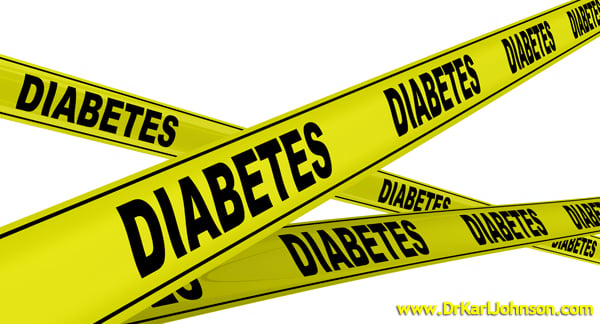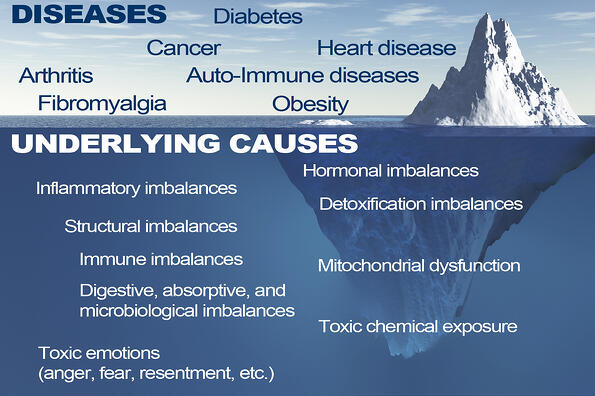Diabetes Type 2, once called non-insulin diabetes mellitus and by other names such as adult onset diabetes is a disease process that can be managed naturally and even reversed in certain situations. The key is not to think of managing type 2 diabetes, but rather helping the individual with diabetes to resolve the underlying cause or causes before the condition is irreversible. There is a point of no return.
The biggest concept to understand is that of labeling a disease process and then going about treating the label. Treating the label is NOT what the topic of this article is about. Rather the thrust of the information you are about to read is how can YOU reverse the process that led to your body’s inability to control blood sugar.
Having the label of pre-diabetic, metabolic syndrome, syndrome X, Type 2 Diabetes are just labels – a convenient way to classify a set of signs and symptoms into a name.
The classical way a medical doctor, also known as an allopathic physician, handles any labeled disease is to use a medication to control symptoms or control chemistry that is out of balance. The term allopathic means opposite of the pathology. So in true to form allopathic care, if you have high blood sugar, you are prescribed a drug that lowers the blood sugar. If you have pain, you are given pain relievers, inflammation…anti-inflammatory, drugs etc.
When you come to someone who is working with you to identify underlying factors for your disease process or ill health, you are working on a root cause approach. Often this type of approach is termed functional medicine.
- Cortisol
- Inflammation
- Vitamin and mineral deficiencies
- Toxin overload
- Adrenal gland health
- Liver health
- Thyroid hormones
Do you really want to live your life again and not feel shackled and not feel chained to the floor by the fatigue of Type 2 Diabetes? Are you embarrassed by poor sexual function and low libido that is common with diabetes? Then you need to step out of the box of one-size-fits-all approach of medical management of diabetes.
Taking the Type 2 Diabetes medications makes it almost impossible to feel good again, especially if you've been taking them for more than a few months.
This type two diabetes monkey on your back forces you to take high blood pressure medication and cholesterol medication and all those medications have side effects. And the side effects are you don’t get to feel like you anymore.
Functional medicine offers unique tools to manage insulin and blood sugar -- including diet, exercise, stress management, detoxification, and maximizing essential nutrients. To understand how all these tools apply, it’s helpful to know how insulin works.
Insulin and Blood Sugar: A Balancing Act. Insulin helps keep glucose (sugar) levels in the bloodstream within normal range. When you eat, carbohydrates are broken down into glucose, our primary energy source. When glucose enters the bloodstream, the pancreas responds by producing insulin, which enables glucose to enter the body’s tissues. Excess glucose is stored in the liver; when needed to sustain blood sugar between meals, the liver releases sugar and the pancreas responds with more insulin to help it enter cells. This balancing act keeps blood sugar stable.
When the pancreas secretes little or no insulin (Type 1 Diabetes), when your body doesn’t produce enough insulin, or when your cells are resistant to insulin (insulin resistance, common in Type 2 Diabetes), sugar levels in the bloodstream can get too high. Chronic high blood sugar can lead to complications such as blindness, nerve damage (neuropathy), and kidney damage.
Managing Insulin with a Multi-Faceted Approach. Certain factors increase the need for insulin:
Diet. What you eat affects your blood sugar and insulin levels.
- Not eating regularly, and eating larger meals causes drops and spikes in blood sugar and insulin, driving insulin resistance. If blood sugar is a problem, better to eat smaller, more frequent meals to keep blood sugar and insulin levels stable.
- Processed and fast foods drive inflammation, which causes insulin resistance and other disease processes. It also increases cortisol levels, which can increase blood sugar levels.
- Food sensitivities cause immune and inflammatory responses, which causes insulin resistance. Many people have food sensitivities they don’t know about.
- Pay attention to Glycemic Index and Glycemic Load. Glycemic index measures the insulin response your body has after eating a food. The higher the number, the more insulin your pancreas needs to secrete. Glycemic load is the amount of that food eaten.
Exercise. Fat cells have insulin receptors. Exercise burns calories and fat; fewer cells mean less need for insulin. And, when you exercise, your muscles need more energy to fire and insulin receptor sites become more receptive. Even a short walk can reduce blood sugar levels and insulin demands dramatically.
Stress. Up to 90 percent of doctor visits are related to chronic stress. Stress has big impact on insulin by decreasing insulin receptor sensitivity, elevating cortisol, and causing the liver to raise blood sugar (the body’s way of increasing energy to handle stressful situations). Raised blood sugar means more insulin.
Toxins. Toxins are found throughout our environment -- in body products, food, air, and water. The body gets overworked trying to deal with them, causing inflammation and increasing insulin resistance. Inflammation shuts down receptor sites, requiring the body to make more insulin.
A Multi-Faceted Approach is Key. For proper diabetes management, we must provide adequate exercise, proper nutrition, and manageable stress levels. As a functional health provider, I understand that you have unique needs and I am prepared to help you develop a customized action plan to help you manage your blood sugar and insulin levels. The functional health provider has to be a good health detective.
We have to dig. You've go to investigate cortisol, adrenal gland health, food sensitivities, bacterial infections, immune system problems, vitamin and mineral deficiencies and toxin overload. A doctor has to look at all those things and that’s one of the reasons why we can create success for people that have been labeled with Type 2 Diabetes because we realize it’s just a label.
And what I do in my program is look at you and your inner workings. Your doctor should treat the person, not the disease or label. I treat the person, not the diagnosis. I treat you, not your Type 2 Diabetes.
Here Are Three Potentially Deadly Mistakes Most Type 2 Diabetics Make Every Day, Year After Year
Right now I’m going to share with you a few of the unknown secrets to success with Type 2 Diabetes.
These next 4 secrets are why a lot of doctors don’t like me. They’d like to gag me and keep me from telling you these secrets because it makes them look incompetent and inadequate. It’s not their fault. Their medical education is what taught them to think the way they do. My education taught me to look at causes. Their education mainly taught them to treat the symptoms.
But you need to know the truth. And the truth is that there are very real factors that can be making your Type 2 Diabetes worse.
And I’m sorry to tell you that if your doctor hasn’t checked these things I am about tell you, then I believe he or she is not doing everything they can and there’s a good chance your condition is not being managed properly.
Potentially Deadly Mistake #1--Thinking the pancreas is the only organ involved in keeping your blood sugar normal.
This is a huge myth.
The organs and glands actually involved in blood sugar control are: Liver, Pancreas, Adrenal Glands and Thyroid.
Each of these parts needs to be tested and evaluated. If one of these organs or glands is not functioning correctly, it can make you have high blood sugar. If this is ignored, you’re just going to continue to get worse as time goes on.
Has your doctor taken the time to investigate the function of these organs or glands? Or have you been rushed into the exam room, had the doctor or nurse practitioner spend less than 10 minutes with you (barely looking in your face) and quickly written you a script and said “We’ll look at your numbers in six months. Good luck.”
With a couple of specialized tests, I can evaluate the function of the glands and organs listed above with a special comprehensive blood chemistry test and another test called DUTCH (Dried Urine Total Complete Hormone). These organs and glands must be investigated and their function measured.
Potentially Deadly Mistake #2 —Not understanding that Inflammation in your body makes your Type 2 Diabetes worse
Inflammation causes you to make more cortisol. High cortisol will make you insulin resistant. Now, the question that must be answered if you’re going to feel better is: Where is the inflammation coming from?
The two most common causes of inflammation are from food sensitivities and hidden infections in your stomach and intestines.
Food sensitivities mean that your immune system has decided that something you are eating is an invader.
Many people have bacterial overgrowths, yeast overgrowths, and parasites—but don’t notice any gastrointestinal (GI) symptoms. This is why you can walk around with these things living in you for years.
Food sensitivities and GI infections cause your immune system to flare up--> inflammation increases--> Cortisol increases --> More insulin resistant = fatigue, no energy, weight gain, low libido, high blood pressure...a hot mess as some of my patients say!
Has your doctor tested for these? I do. I test every Type 2 Diabetic patient for them.
Potentially Deadly Mistake #3--Thinking Type 2 Diabetes is Genetic.
Now obviously, you could have been born with a predisposition for developing diabetes.
Your environment—what you do to yourself, and what happens to you—is what really determines whether or not you develop Type 2 Diabetes.
Throwing your arms up and saying “well, there’s nothing I can do about it.”...Or, worse, a doctor who says, “It’s not surprising you have diabetes. It runs in your family.” This ignorant attitude handcuffs your body’s natural ability to heal. You must have the right attitude.
Let’s be clear: there is a time and place for medication. And certainly don’t ever stop taking any of your medications without talking to your doctor.
But more important is finding the cause for YOUR Type 2 Diabetes. Because treating the wrong thing is a waste of time and money.
Did your doctor sit down with you and really explain your condition? What it means?
I understand that Type 2 Diabetes is epidemic, and that a lot of people seem to think “its no big deal”, but it can ruin your life.
I want you to be brutally honest with yourself right now...
If your doctor is not investigating the factors I just talked about...
Well, then your doctor is probably blocking your ability to get better; to enjoy the life you deserve...the life you enjoyed before Diabetes.
You deserve better, don’t you? You need a doctor who can bring it all together for you.
For more details about the natural approach I take with my patients, take a look a the book I wrote entitled: Reclaim Your Life; Your Guide To Revealing Your Body's Life-Changing Secrets For Renewed Health. It is available in my office or at Amazon and many other book outlets. If you found value in this article, please use the social sharing icons at the top of this post and please share with those you know who are still suffering with cognitive issues or other chronic health challenges, despite receiving medical management. Help me reach more people so they may regain their zest for living! Thank you!
ALL THE BEST – DR. KARL R.O.S. JOHNSON, DC – DIGGING DEEPER TO FIND SOLUTIONS





